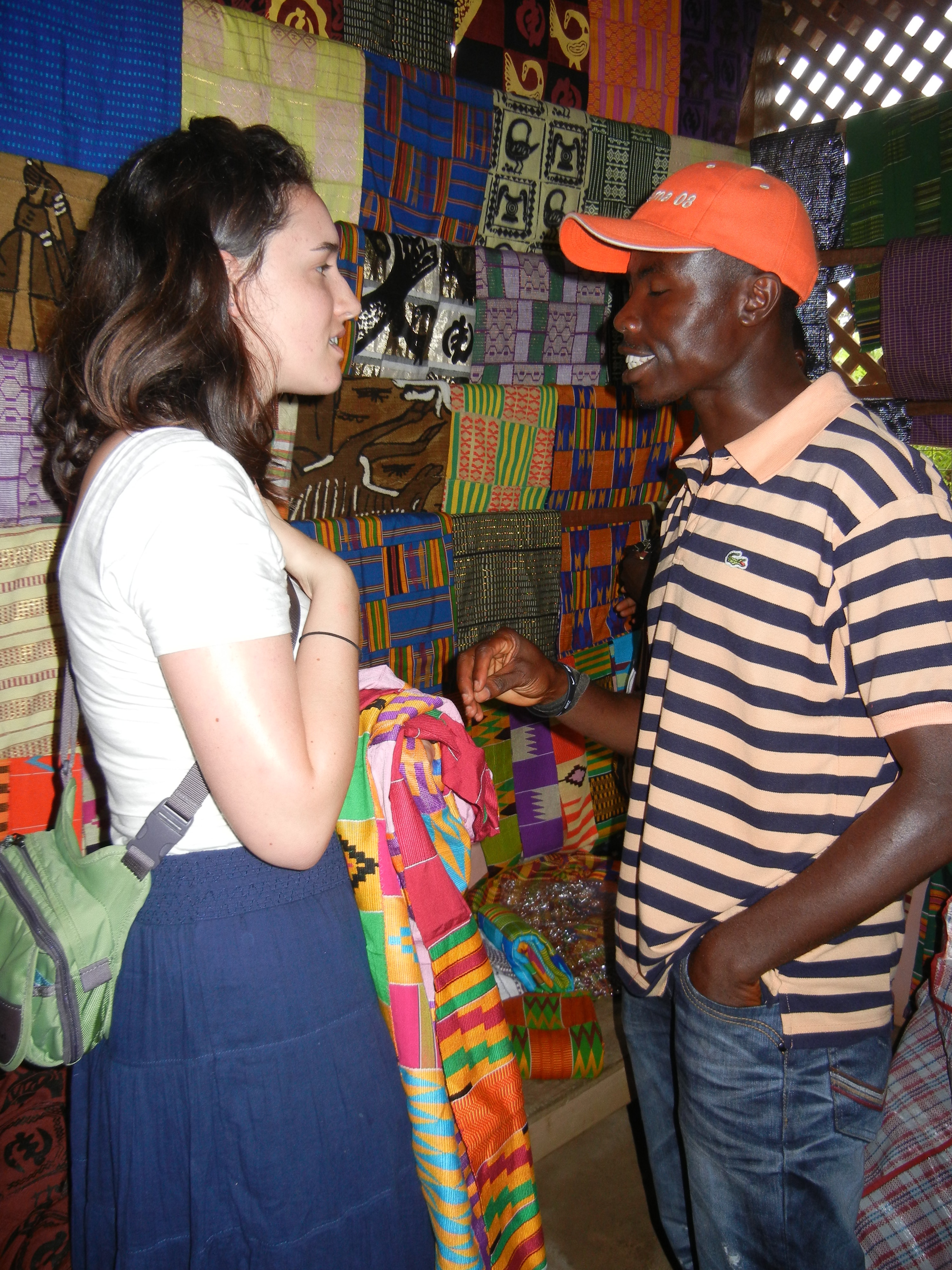 Part of our trip to Kumasi included an outing to Bonwire, the birthplace of kente cloth. Kente cloth is a fabric, first woven into strips, that comes in array of patterns and colors that have specific meanings and are usually used as decoration.
Part of our trip to Kumasi included an outing to Bonwire, the birthplace of kente cloth. Kente cloth is a fabric, first woven into strips, that comes in array of patterns and colors that have specific meanings and are usually used as decoration.
At first, I did not anticipate buying anything at the factory, as kente tends to be pricey, but I found a blanket-sized kente that I immediately fell in love with. I picked up the kente and studied the multicolored, expertly weaved squares of fabric and asked the nearest weaver the price.
What followed was the most intense session of bargaining I have ever endured. The weaver, who I later found is the head weaver, set the price at eighty cedi. As bargaining etiquette dictates, I looked at him in shock, my mouth agape, then laughed and shook my head. “That is too much.” He asked me what my price was, and I said forty cedi. It was a bold move to ask half the price he stated, but I knew the cloth was not worth eighty, so I started low. This is typical of bargaining in Ghana, but the weaver looked at me like I was insane. “Let me tell you something…”, he said, and then he listed multiple reasons why the cloth was worth eighty cedi. Some of the squares of fabric were triple weaved, the cloth was eight squares across and fourteen squares long, it was very unique, etc.
We had this same conversation at least ten times, which all started with the weaver intensely saying, “Let me tell you something.” He told me repeatedly why the fabric was so special. I said yes, it is very nice, and I love it, but I can’t pay that much.
After about fifteen minutes, I eventually worked the price down to sixty cedi, but I still knew that was too much. I told him that I didn’t have that much money on me, which was the truth.
There came a point when I was tired of bargaining, and I had to make the choice to either suck it up and pay sixty or walk away. The weaver was clearly done bargaining.
bargaining.
That’s when I discovered a small hole in one of the fabric squares. I got the attention of the weaver again, pointed to the hole, and told him he should give me a better price.
He examined the hole and said that they could fix it up for me, but he still refused to reduce the price, even when I offered fifty, and then fifty-five cedi.
At this point, I was outraged. Leslie was nearby, and I called her over. She defended me by saying I was a student and did not have that much money. She also argued that she brings students to the factory every year, so he should give me a good price.
Still, the stubborn weaver did not accept any lower prices. By this time, most of the group was back on the bus and ready to move on to our next excursion.
I accepted my defeat and began to walk out to the bus. Leslie told me, in her usual chipper manner, that the weaver might follow us out and offer a lower price. But he didn’t, and I immediately regretted not buying the cloth. Leslie somehow intuitively knew this and told me I should go back and get it.
So I ventured back inside, intent on getting that kente. The second time around, I was armed with Neethu, the expert bargainer, and Sonny, our Ghanaian friend and babysitter. I marched back inside and said I did not have very much time. Under the pressure of three people, the weaver offered fifty cedi. We offered forty-five, and he shook his head. Sonny said forty-seven, and the weaver hesitated. I assumed that meant yes. I pulled out my money, Sonny took it and handed it to the weaver, then practically forced the man to give us the proper change. Sonny laughed and told me to give the weaver a hug. With the prize tucked under my arm, I gave the begrudged man quick hug, said thank you, and ran out to the bus.
I am still proud of my purchase, but the process was exhausting, and I have not bargained since.




Alex kiddle
July 22, 2011 — 5:27 pm
Intense! Haha glad you got something to remember the experience by after all that bargaining
Erik
July 23, 2011 — 4:03 pm
I remember bargaining a lot when I lived in Ghana as a Peace Corps Volunteer and afterwards saying to myself, I just spent 15 minutes or more to save the equivalent of $1…or less. As a PCV you tend to know prices, you don’t earn much, and you hate the feeling of getting ripped off because you are white and hence supposedly rich. You story brought back memories..sometimes the haggling was actually fun.
Debbie Hart
July 25, 2011 — 3:59 am
Wow! Elise, I’m so proud of you for hanging in there. The fabric looks very fun and I’m looking forward to seeing what it turns into!
xoxo
Janice Yaden
August 11, 2011 — 10:32 am
I loved your story. I agree that haggling is exhausting. Sometimes I don’t buy things just because it doesn’t seem worth the haggle and then I always regret it.